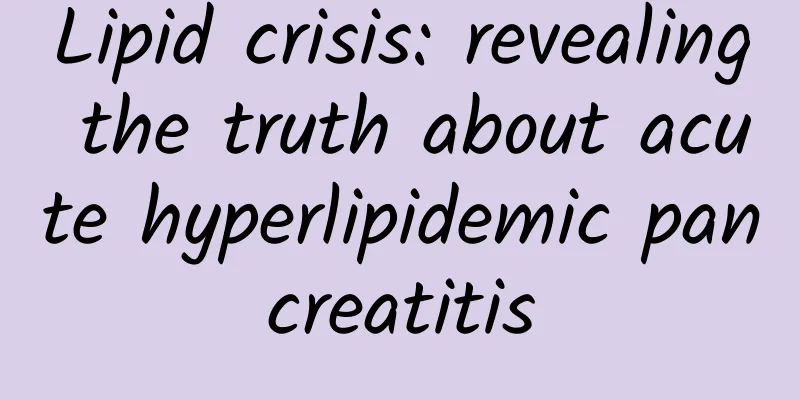Lipid crisis: revealing the truth about acute hyperlipidemic pancreatitis

|
This is the 5289th article of Da Yi Xiao Hu Today, I would like to share with you a real case: Mr. Ma, 43 years old, suddenly felt severe abdominal pain and difficulty breathing after attending a banquet, and was immediately rushed to the hospital by 120. During the emergency treatment and relevant examinations. Shockingly, the blood drawn from Mr. Ma's blood vessels was "stained" with thick white oil. Blood test results: triglycerides as high as 45.37 mol/L, serum amylase was 1014 U/L. Further abdominal CT examination showed that the pancreas was diffusely enlarged with extensive exudation around it; diffuse ground glass exudation also appeared in both lungs. After a comprehensive evaluation, Mr. Ma was diagnosed with acute hyperlipidemic pancreatitis combined with acute respiratory distress syndrome (ARDS), and his condition was critical, so he was immediately rushed to the ICU. He only attended a banquet, why did he suddenly develop such a serious and dangerous condition? Today, let us uncover the truth behind this condition. 1. What is acute hyperlipidemic pancreatitis? Acute hyperlipidemic pancreatitis is a disease caused by a significant increase in the patient's blood lipid level, which leads to pancreatic capillary damage, pancreatic microcirculation disorders, tissue ischemia and hypoxia, and then acute pancreatitis. In recent years, with the improvement of people's living standards and changes in eating habits, the incidence of acute hyperlipidemic pancreatitis has gradually increased, seriously threatening people's health. 2. What are the causes of acute hyperlipidemic pancreatitis? (1) Hypertriglyceridemia This is the main cause of acute hyperlipidemic pancreatitis. When triglyceride levels are too high, they accumulate in the pancreas and activate pancreatic enzymes, breaking down triglycerides into a large number of free fatty acids, which are highly toxic and can easily damage the pancreas and induce acute inflammation. (2) Diet and lifestyle habits Excessive fat intake and heavy drinking are important factors that induce acute pancreatitis. Long-term drinking can lead to poor bile excretion, thereby increasing the risk of pancreatitis. (3) Genetic factors Certain genetic factors may lead to abnormal lipoprotein metabolism, such as familial hypertriglyceridemia, which also increases the risk of acute hyperlipidemic pancreatitis. (4) Other factors Other possible causes include pancreatic duct obstruction, surgery and trauma, medications, infection, and systemic inflammatory response. 3. What are the symptoms of acute hyperlipidemic pancreatitis? Symptoms of acute hyperlipidemic pancreatitis are similar to those of acute pancreatitis and include: (1) Severe abdominal pain Abdominal pain is mostly located in the upper abdomen, and is persistent, piercing or dull, and may radiate to the waist, back and shoulders. (2) Nausea and vomiting Nausea and vomiting often occur at the same time as abdominal pain, and the vomitus are mostly stomach contents. (3) Other symptoms Symptoms include abdominal distension, palpitations, low blood pressure, fever, etc. Severe patients may have pale complexion, cold limbs, increased heart rate, low blood pressure and shock. When combined with acute respiratory distress syndrome, patients may also experience breathing difficulties, decreased blood oxygen saturation, and even life-threatening conditions that require immediate rescue. 4. Treatment of acute hyperlipidemic pancreatitis? The treatment of acute hyperlipidemic pancreatitis requires rapid removal of the primary and secondary factors that cause hyperlipidemia and rapid reduction of serum triglyceride levels to a safe range. Treatment methods include: 1. Lipid-lowering drug treatment; 2. Insulin therapy; 3. Blood purification; 4. Other treatments; 5. How should we prevent acute hyperlipidemic pancreatitis in life? (1) Eat a healthy diet Maintain a low-fat, low-sugar, high-fiber diet, eat more vegetables, fruits and other foods rich in fiber, and reduce the intake of high-fat, high-sugar and high-cholesterol foods. (2) Exercise moderately Insist on moderate exercise, such as walking, jogging, swimming, etc., to enhance cardiopulmonary function and improve the body's metabolism. (3) Control your weight Maintain a healthy weight and avoid obesity. (4) Avoid excessive drinking Alcohol will stimulate pancreatic secretion and increase the burden on the pancreas, so excessive drinking should be avoided. Acute hyperlipidemic pancreatitis is a disease with rapid onset, severe condition, many complications and high mortality rate. Most patients can recover after treatment, but a few may die from complications. Through this popular science article, we know that healthy eating habits, a reasonable lifestyle and regular physical examinations can effectively prevent the occurrence of this disease. If symptoms of pancreatitis occur, you should immediately go to the nearest hospital's emergency department, surgery department or gastroenterology department for treatment. Author: The Second Affiliated Hospital of Xi'an Jiaotong University Written by: Fu Chunxue, resident physician in the emergency department Supervisor: Pei Honghong, Chief Physician of Emergency Department |
<<: Is it necessary to take anti-inflammatory drugs after a burn?
>>: The benefits of eating more dietary fiber
Recommend
A stool was sold for 7,900 yuan, claiming to be able to cure COVID-19. A case has been filed for investigation!
Recently, on the streets of Shenyang, Liaoning, m...
What happens if leucorrhea is mixed with urine routine?
If women do not pay attention to taking care of t...
What is the reason for sudden stomach pain in women?
We all know that women have their menstrual perio...
What are the consequences of irregular menstruation?
Most women have experienced menstrual irregularit...
What should I do if my breasts become swollen and painful during weaning?
Mothers with sufficient breast milk can help thei...
Can pregnant women eat mangosteen?
Mangosteen is a fresh fruit that is not very comm...
At what age do women usually reach menopause?
Women generally go through menopause around the a...
What causes dryness during intercourse after childbirth?
After giving birth to a baby, the couple's in...
What is the nutritional value of yuba? How to soak yuba
Yuba is a high-end soy product. With its high nut...
25-hydroxyvitamin D deficiency in pregnant women
Congenital rickets is related to vitamin D defici...
I have a callus on my genitals. What's going on?
Ladies, please take note. The symptom of pubic ca...
Symptoms of fresh embryo implantation
There are many treatments for diseases such as in...
How to tell if salmon is fresh? How to fry salmon to make it delicious
I believe everyone knows that salmon should be fr...
What to eat after 13 days of normal delivery
Natural childbirth is the best choice for pregnan...
Can motherwort stop menstruation?
The symptoms of irregular menstruation are more o...









